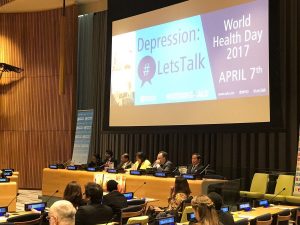Opening remarks by H.E. Ms. Dessima Williams, Special Adviser to the President of the 71st Session of the General Assembly, at World Health Day 2017
7 April 2017
Distinguished Guests,
Ladies and Gentlemen,
Good morning to you all,
I am honored to be here this morning representing the President of the UN General Assembly, His Excellency Mr. Peter Thomson, who unfortunately cannot be present today due to other planned commitments.
For every year since 1950, the United Nations family and partners around the world come together on World Health Day to highlight a public health issue of global concern. And for this year, the highlight is on depression.
Depression is a mental disorder that affects people of all ages, from all walks of life, in all countries. It causes immense suffering and can prevent us from carrying out our usual daily activities, sometimes for long periods of time.
Yet, depression can be treated, at relatively low cost.
The first step towards getting help – talking to someone we trust – is often the most difficult. This is why I am glad that the World Health Organizations campaign is called “Depression: let’s talk”.
According to the latest estimates, more than 300 million people are living with depression on daily basis. Depression is the top cause of global disability worldwide, closely linked to cardiovascular diseases, and at its worst, can lead to suicide.
Depression is especially common among vulnerable people. Here, I will focus on three groups of vulnerable people.
First, people living through humanitarian emergencies and crisis including refugees and those who are forced to migrate, such as people today in Syria, Iraq, Yemen, Somalia, South Sudan amongst others. As many as one in five people living in humanitarian emergencies or conflict situations are affected by depression and anxiety.
Second, women affected by violence. Depression is nearly 50% more common among women than men. While there are likely multiple reasons for this, sexual and intimate partner violence against women is a potent risk factor for depression.
Third, people who face economic challenges. Depression is more common among the poor especially among those who lose their job. Depression makes it difficult for those out of work to reinter the workforce.
Excellencies,
Ladies and Gentlemen,
When the President of the General Assembly H.E Mr Peter Thomson started his tenure in September, he made the push for implementation of the sustainable goals his main agenda.
Mental health is captured in the Sustainable Development Goals on poverty, hunger, health, education, employment and economic growth, inequalities, urbanization, partnerships, and peace, and a prerequisite for the achievement of all Goals.
For example, depression has inevitable consequences for employers and governments as a result of diminished productivity at work, reduced rates of labour participation and increased health and other welfare expenditures. These consequences are estimated to cost more than 1 trillion dollars every year.
In conclusion, let us promote the idea that depression can be prevented and treated. Talking is the start. But we also need to work collectively to ensure that support is available in health services in all countries so that when people ask for help, they receive it.
I thank you


